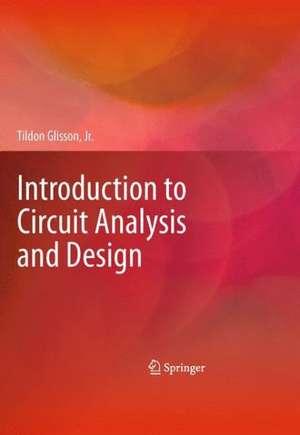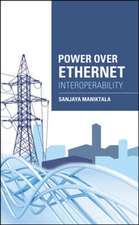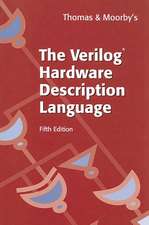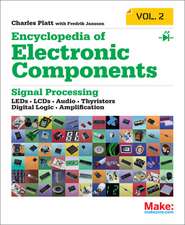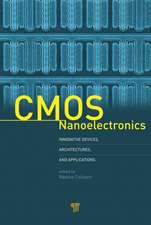Introduction to Circuit Analysis and Design
Autor Tildon H. Glissonen Limba Engleză Paperback – 26 noi 2014
| Toate formatele și edițiile | Preț | Express |
|---|---|---|
| Paperback (1) | 569.78 lei 38-44 zile | |
| SPRINGER NETHERLANDS – 26 noi 2014 | 569.78 lei 38-44 zile | |
| Hardback (1) | 754.80 lei 38-44 zile | |
| SPRINGER NETHERLANDS – 27 ian 2011 | 754.80 lei 38-44 zile |
Preț: 569.78 lei
Preț vechi: 703.44 lei
-19% Nou
Puncte Express: 855
Preț estimativ în valută:
109.04€ • 112.65$ • 90.75£
109.04€ • 112.65$ • 90.75£
Carte tipărită la comandă
Livrare economică 22-28 martie
Preluare comenzi: 021 569.72.76
Specificații
ISBN-13: 9789401780742
ISBN-10: 9401780749
Pagini: 788
Ilustrații: XV, 768 p.
Dimensiuni: 193 x 260 x 41 mm
Ediția:2011
Editura: SPRINGER NETHERLANDS
Colecția Springer
Locul publicării:Dordrecht, Netherlands
ISBN-10: 9401780749
Pagini: 788
Ilustrații: XV, 768 p.
Dimensiuni: 193 x 260 x 41 mm
Ediția:2011
Editura: SPRINGER NETHERLANDS
Colecția Springer
Locul publicării:Dordrecht, Netherlands
Public țintă
Lower undergraduateCuprins
Preface. 1 Introduction. 2 Current, Voltage, and Resistance. 3 Circuit Elements, Circuit Diagrams, and Kirchhoff’s Laws. 4 Equivalent Circuits. 5 Work and Power. 6 Dependent Sources and Unilateral Two-Port Circuits. 7 Operational Amplifiers I. 8 Capacitance. 9 Inductance. 10 Complex Arithmetic and Algebra. 11 Transient Analysis. 12 Sinusoids, Phasors, and Impedance. 13 Complex Power. 14 Three-Phase Circuits. 15 Transfer Functions and Frequency-Domain Analysis. 16 Fourier Series. 17 Operational Amplifiers II: AC Model and Applications. 18 Laplace Transformation and s-Domain Circuit Analysis. 19 Active Filters. Appendix: Answers to Exercises. Index.
Recenzii
A strength of the book is its practical flavor. Without doubt, this will make it appealing to students.
Art Davis, Prof. Emeritus at San Jose State University in California
-----
This introductory circuits text presents a more complete coverage of operational amplifiers than other such texts, providing theoretical and practical information needed by today's electrical engineers.
John Hauser, Prof. at North Carolina State University
-----
Glisson's text does a great job of combining fundamental concepts, clear explanations and practical applications of the introductory circuits material.
John Trussell, Prof. at North Carolina State University
Art Davis, Prof. Emeritus at San Jose State University in California
-----
This introductory circuits text presents a more complete coverage of operational amplifiers than other such texts, providing theoretical and practical information needed by today's electrical engineers.
John Hauser, Prof. at North Carolina State University
-----
Glisson's text does a great job of combining fundamental concepts, clear explanations and practical applications of the introductory circuits material.
John Trussell, Prof. at North Carolina State University
Notă biografică
Tildon H. Glisson is Professor Emeritus of Electrical Engineering at North Carolina State University, where he taught graduate and undergraduate courses in communication, control, signal processing, and (most recently) electric circuits. He served as Director of Graduate Programs for the Electrical and Computer Engineering Department and as Associate Dean and Interim Dean of the College of Engineering.
Textul de pe ultima copertă
Introduction to Circuit Analysis and Design takes the view that circuits have inputs and outputs, and that relations between inputs and outputs and the terminal characteristics of circuits at input and output ports are all-important in analysis and design. Two-port models, input resistance, output impedance, gain, loading effects, and frequency response are treated in more depth than is traditional. Due attention to these topics is essential preparation for design, provides useful preparation for subsequent courses in electronic devices and circuits, and eases the transition from circuits to systems.The differences in depth of treatment arise from a focus on teaching analysis as preparation for design, where the devil is in the details. Introduction to Circuit Analysis and Design gives due attention to differences between physical circuits or devices and circuit or device models, including variation of resistance and capacitance with temperature, variation of resistance with frequency, parasitic and stray capacitance and inductance, residual effects such as leakage resistance of capacitors and winding resistance of inductors, and other such things either not covered or barely mentioned in other books. The treatment of operational amplifiers goes well beyond the ideal model, covering topics such as gain-bandwidth product, slew rate, bias-current compensation, output swing, and power dissipation, all of which must be considered in any realistic design. Where appropriate, chapters conclude with a section that discusses implications for and applications to design.
Caracteristici
Emphasis on input-output properties and descriptions of circuits Emphasis on symbolic relations among currents, voltages, and other quantities Inclusion of topics important in design but not found in competing books More than 800 in-line examples and exercises and more than1100 end-of-chapter problems Sections on methods for checking intermediate and final results
